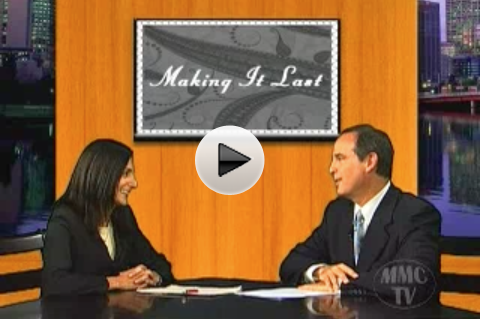In the News
Donald S. Paris Named a Star Influencer for 2016 by SmartCEO's Centers of Influence
 Donald S. Paris
Donald S. Paris
Managing Member
Read the full article on SmartCEO here.
“I truly enjoy what I do, and I hope my clientele believe that it shows,” says Donald S. Paris. At his firm, Donald Paris CPA LLC, Paris manages growth carefully. “I believe that growth for growth’s sake results in a multitude of client and practice issues,” he says. “Instead, I focus on limiting my practice to clientele I believe I can provide the highest level of service to.”
QUICK TIP: “If money can solve a problem, let it.”
 “In 2004, I started my IT services company, Yamashita Solutions, LLC. My employees were located in [four states]. As a novice small business owner, I handled all the administrative tasks, including ‘tax accountant.’ As you might guess, I was completely unprepared and unaware of the tax filing requirements for each state. I also started a 401(k) plan for the company, and the reporting requirements for the matching contributions compounded my headaches. The result was an audit and a stream of notices of delinquent income reporting. On a recommendation from a friend, I contacted Don and asked about his services. During our initial interview, I was impressed by Don’s acumen and keen analysis as he asked very detailed questions about the company structure, the 401(k) plan, the revenue stream and expenses. … I entered into an agreement right then and there. Subsequently, he helped me establish a set of strict procedures to account for all revenues, expenses and estimated tax payments. Twelve years have passed, and it was one of my wisest moves.”
“In 2004, I started my IT services company, Yamashita Solutions, LLC. My employees were located in [four states]. As a novice small business owner, I handled all the administrative tasks, including ‘tax accountant.’ As you might guess, I was completely unprepared and unaware of the tax filing requirements for each state. I also started a 401(k) plan for the company, and the reporting requirements for the matching contributions compounded my headaches. The result was an audit and a stream of notices of delinquent income reporting. On a recommendation from a friend, I contacted Don and asked about his services. During our initial interview, I was impressed by Don’s acumen and keen analysis as he asked very detailed questions about the company structure, the 401(k) plan, the revenue stream and expenses. … I entered into an agreement right then and there. Subsequently, he helped me establish a set of strict procedures to account for all revenues, expenses and estimated tax payments. Twelve years have passed, and it was one of my wisest moves.”
– Rory J. Walsh, President and CEO, Yamashita, Solutions, LLC
Tax Court Agrees with Ex-Wife that Payments Received Under the Divorce Agreement are Not Alimony
By Donald Paris, CPA MST CDFA
Today we look at the Tax Court Memo decision 2015-163 in Crabtree. This is yet another case where the Tax Court did not agree with the IRS. In this case, the Court held that the series of payments received by the taxpayer, from her ex-husband pursuant to a divorce agreement, were not considered alimony and thus, did not have to be included in income. Even though the payments were laid out in the Marital Settlement Agreement (MSA) to be paid for a period of 8-years, the MSA did not indicate that the payments would terminate if the ex-wife were to die before that period ended.
Now for some background understanding of Internal Revenue Code (IRC) Section 71. IRC Section 71 tells us that gross income includes amounts received as alimony or separate maintenance agreements where:
- The payments must be made under a divorce or separation instrument;
- The instrument must not designate the payment as not includable in the recipient spouse’s gross income under IRC Section 71 and not deductible by the payor spouse under IRC Section 215;
- Legally separated spouses under a decree of divorce or separate maintenance must not be members of the same household when the payments are made; and
- The payor’s obligation to make the payment must end at the death of the payee spouse.
Now to the facts of the case. Esther Crabtree was married to Donald Girard MD until late 2006. In December of 2006, they entered into a divorce agreement that was entered as an order of the Delaware Family Court. That agreement contained a provision that “Dr. Girard will continue to tender unallocated alimony/child support in the monthly sum of $5,232 for a continued 8-year period with the provision as long as Mrs. Girard should not remarry or cohabitate”. Note here that the last provision of IRC Section 71 was not dealt with, i.e. the agreement was silent to the issue that the payments must end on the death of Ms. Crabtree.
The Tax Court noted that, even if the agreement is silent or unclear on the existence of a post-death obligation, the payments may still be alimony if the payment obligation automatically terminates on the death of the payee spouse by operation of State law, which happens under Delaware law. Interestingly, the Court went further to say that this provision only applies to judicially decreed alimony agreements, and not to the agreement at hand. In our case, the parties came to the agreement and the Family Court merely entered it into the record as part of the case, rather than the Family Court ruling on the issue.
The Tax Court made what appears to be a very interesting distinction, i.e. even though Delaware law may state that, in the absence of language in the MSA dealing with the issue of death and alimony payments, state law only applies where the Family Court is ruling on the issue, and thus, the agreement between the parties takes precedence. That is a remarkable concept. It further affirms our conviction that we must make sure that the Marital Settlement Agreement spells out all the tax issues, because it is that agreement that may operate.
How to Not Deduct Alimony
By Donald Paris, CPA, MST, CDFA
So, you have finally reached agreement and now have agreed that alimony will be paid. Your attorney prepares your Property Settlement and Separation Agreement, which included the provision for this alimony. The Agreement had all the bells and whistles so that the alimony would be deductible on the wife’s tax return and included as income on the husband’s tax return.
You think about it a little more, and still not totally happy with this, you don’t sign the Agreement. Instead, you pay the alimony amount you feel is right.
Your spouse, not being happy with your decision to pay this amount, takes you to court in the hopes that a judge will make you pay the amount you verbally agreed on. And, guess what? You lose.
While all of this was happening, you prepared and filed your tax returns, claiming the amount you paid as alimony. And, just like the rest of your luck, you are audited for this alimony for one simple reason, i.e. the amount you paid and deducted did not match the income shown on your spouse’s tax return. And, just like a friend of mine says “If I didn’t have bad luck, I wouldn’t have any luck at all”. IRS disallows the deduction and you now have to pay the tax and penalties and interest.
Fair? Maybe not. But, the IRS was right. The alimony was not deductible since it did not comply with the Internal Revenue Code.
Take a look at the 2015 decision of the Tax Court in Milbourn, TC Memo 2015-13. The draft Agreement in that case called for alimony of $6,000 per month, but the taxpayer wanted it to be $2,500. Because of this disagreement, no one signed the Agreement. Two years later, the final divorce decree was issued. It ordered the husband to pay his ex-wife $4,500 per month in alimony, with payments received treated as earnings in accord with federal and state law. Both parties signed the final Agreement.
The taxpayer argued with the IRS that the payments made prior to the final Agreement were pursuant to the draft Agreement. The IRS argued that the payments did not meet the Code’s definition of alimony because there was no divorce or separation agreement at the time that the earlier set of payments were made.
The Tax Court acknowledged that there was no signed Agreement or divorce decree during the time that the earlier payments were made. Therefore, though payments were made, they were not the result of an Agreement, written or otherwise. Though there was an Agreement, since it was never signed, there was not even a meeting of the minds between the parties.
Let’s take a quick look at Regulation 1.71-1 Alimony and separate maintenance payments, income to wife or former wife. Specifically, 1.71-1(b)(2) deals with Written separation agreement. It says “Where the husband and wife are separated and living apart and do not file a joint income tax return for the taxable year, paragraph (2) of section 71(a) requires the inclusion of gross income of the wife of periodic payments (whether or not made at regular intervals) received by her pursuant to a written separation agreement executed after August 16, 1954. The periodic payments must be made under the terms of the written separation agreement after its execution and because of the marital or family relationship.”
So, what can we learn from this Tax Court decision? Simple, if you do not have a signed written agreement to pay a certain alimony, you can’t deduct any payment that you make. You can only deduct the payments you make after the agreement is signed. And, if for a moment you think the IRS won’t know the difference, do not forget that when you file your tax return claiming the alimony deduction, you state the name and social security number of the person you paid. So, the amount shown as a deduction on your tax return better match the income shown on your spouse’s return. If it doesn’t, the IRS will ask about it.
Do I Recognize Gain on Sale of Property to an Ex-Spouse?
By Donald Paris, CPA MST CDFA
Today we look at the Tax Court case of Belot, TC Memo 2016-113, which held that the taxpayer’s sale of his interests in marital businesses to his ex-wife in accordance with their marital settlement agreement did qualify for non-recognition treatment of the gain under Internal Revenue Code (IRC) Section 1041.
Before we get into the specifics of the case, we have to remember that the general rule under IRC 1041 is that “no gain or loss shall be recognized on a transfer of property from an individual to (or in trust for the benefit of) a spouse or a former spouse, but only if the transfer is incident to the divorce”. Sounds pretty simple. If you have an asset which has appreciated and you give it to your spouse or former spouse in divorce, you don’t have to tax the appreciation/gain. So, you have to ask yourself, i.e. if this is such a simple concept/rule, then why is there a Tax Court case? Well, IRC 1041 explains that a “transfer incident to divorce” is one where the transfer occurs within one-year after the date that the marriage ceases or is related to the cessation of the marriage.
Now to the case. During the marriage, the taxpayer and his ex-wife jointly owned three businesses. Their divorce was finalized in January 2007. The Marital Settlement Agreement (MSA) equalized their interests in these businesses, whose interests during the marriage were not equal. In September 2007 (only 9 months after the MSA was signed) the ex-wife filed a complaint where she claimed he mismanaged the businesses, and further asking for his removal as a director and employee of one of the businesses and to sell her shares in the business. To settle that lawsuit, he sold his ex-wife his shares in 2008 for $1.58 million. Remembering that the sale occurred more than a year after cessation of the marriage, the IRS wanted him to recognize taxable gain on that sale.
The IRS argued many different items, which were all rejected by the Tax Court.
- The IRS argued that the transfer under the second settlement agreement did not qualify because that settlement did not relate to the divorce agreement. This argument was not upheld because the regulations under IRC 1041 says “this presumption may be rebutted only by showing that the transfer was made to effect the division of property owned by the former spouses at the time of the cessation of the marriage”.
- The IRS also argued that the MSA resolved all the property issues between the taxpayer and his ex-wife. The Tax Court pointed out that neither IRC 1041 nor its regulations limit the application of the section to one, or the first, division of marital property.
- The IRS argued that in form and in substance, the division of the marital businesses made the second settlement agreement a sale of the property. Tax Court said no.
- The IRS also argued that the second settlement characterized the ex-wife’s dissatisfaction with the first settlement, and thus became a business dispute. The Tax Court said that though this may be true, the Code and Regulations can apply to marital property that consists of business-related property.
So, what does this tell us. First, it tells us that just because the IRS says something is so, it is not always so. Next, it tells us that whenever there is a transfer of an asset from one spouse or ex-spouse to the other, we should be mindful of properly documenting the issue in the Marital Settlement Agreement. We want to make sure that the Agreement deals with all the known and potentially unknown tax ramifications. And lastly, it tells us that we must keep the Internal Revenue Code and its Regulations in mind as we are entering into an agreement that may have a tax effect. To ignore them will only create problems down the road.
Can My Boyfriend Take Part of My Home Mortgage Interest Deduction?
By Donald Paris CPA MST CDFA
Interesting question that the Tax Court Summary Opinion 2016-33 dealt with in Jackson. The Court held that, where an unmarried couple who lived together in a residence that was owned and financed solely by the woman, the boyfriend could not deduct amounts he paid the woman as his share of the mortgage interest.
Now for some tax education. Internal Revenue Code (IRC) Section 163 allows a taxpayer a deduction (within certain limits) for payments of qualified mortgage interest. Everyone knows about this one. More specifically, Section 163 allows the interest paid as deductible where the mortgage is one in which he (or she as this case has it) is the legal or equitable owner, even though he is not directly liable on the bond or note secured by the mortgage. In determining whether a taxpayer has any of the benefits and burdens of ownership of the property, the Tax Court considered whether the taxpayer:
- Has a right to possess the property and to enjoy the use, rents or profits;
- Has a duty to maintain the property;
- Is responsible for insuring the property;
- Bears the property’s risk of loss;
- Is obligated to pay the property taxes, assessments or charges;
- Has the right to improve the property without the owner’s consent; and
- Has the right to obtain legal title at any time by paying the balance of the purchase price.
In Jackson, during 2011 and 2012 James lived with his girlfriend, Julie, who purchased the residence in 2005. Julie had a mortgage on the property and was listed as the sole owner of the property as she was the sole person on the deed to the property. Technically, she was the only person responsible for the mortgage on the property. James and Julie lived as “domestic partners” sharing the expenses of the residence. As such, James claimed he transferred $1,000 in cash to Julie every month to make interest only payments on the mortgage.
The Tax Court held that James did not qualify for an interest deduction. He did not establish himself as an owner of the property. The Court looked at Nevada law to help them with this decision. The Supreme Court of Nevada recognizes that unmarried adults may expressly or impliedly agree to hold property as though it were community property. The problem with our case is that James did not provide any objective evidence that he paid the mortgage interest or that he was an equitable owner of the property. He did not produce any bank statements, receipts or other evidence that he actually transferred money to Julie to pay the mortgage or other expenses. Note to self – always have a record of a payment.
So, what have we learned from this case? Simple, (a) if you have an agreement on an item, put it in writing, (b) if you claim a deduction on your tax returns, have documentation/evidence to prove the amounts are accurate and lastly (c) only deduct items on your tax return you have a legal basis to deduct.
August 2015
Don was the contributing author to the chapter, "Mediating Financial Issues" in "Family Mediation: Theory and Practice" by Jane C. Murphy and Robert Rubinson, Second Edition.

